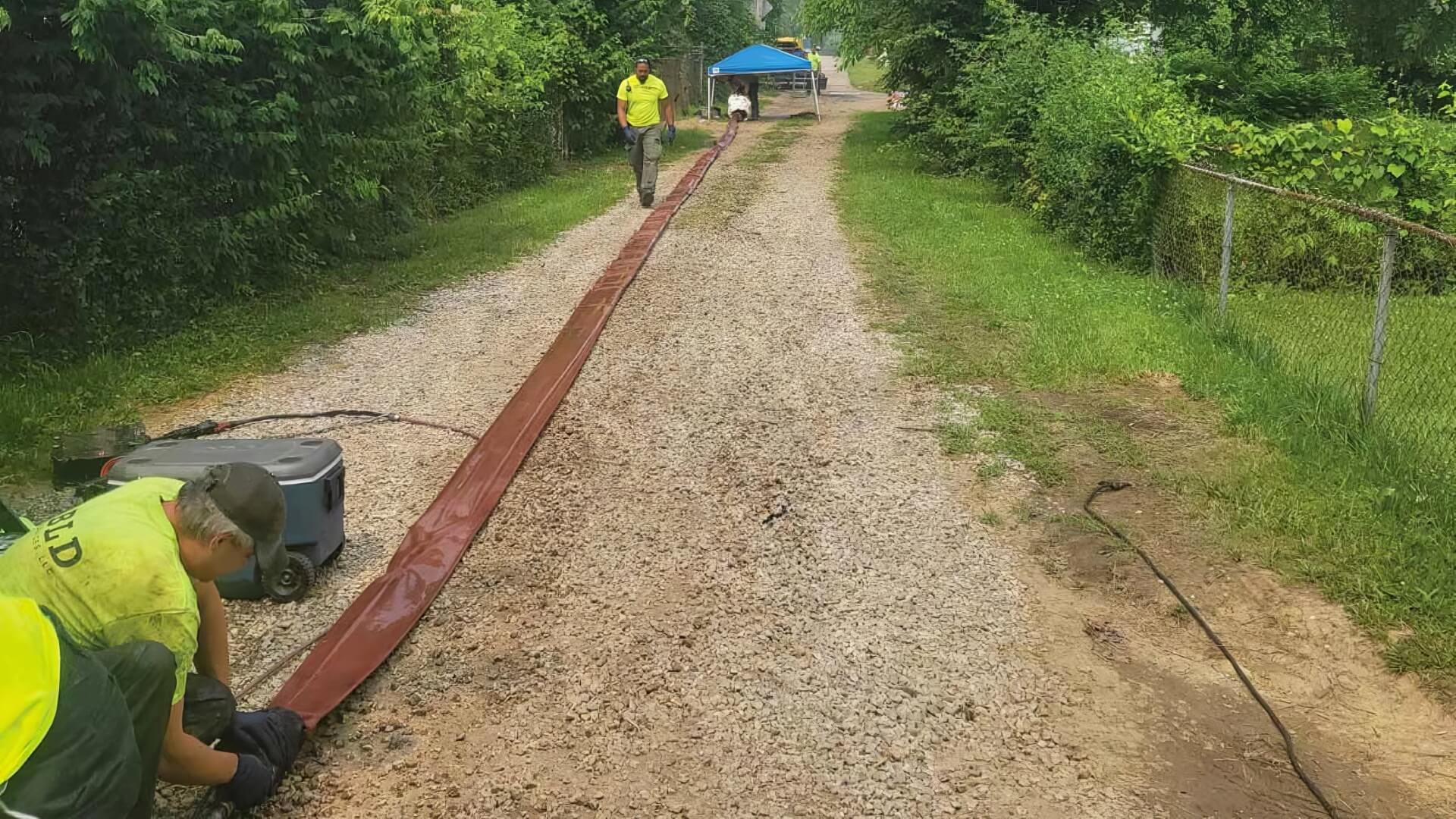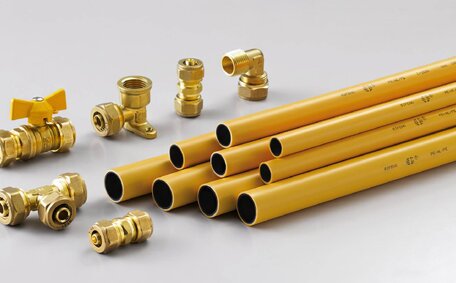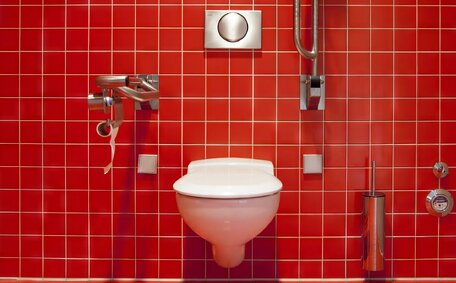How Tankless Water Heaters Provide On-Demand Hot Water
Tankless water heaters, also known as instantaneous or on-demand, heat water directly without the need for a storage tank.
A tankless heater operates more efficiently than traditional models, producing hot water instantly upon the activation of a hot water tap.
Inside the tankless unit, cold water flows through unit of heating elements or a gas burner which rapidly heats the water as it achieves flow through.
Flow sensors regulate the water temperature, ensuring it satisfies your requirements for various uses like bathing and washing. The flow of water also triggers the gas burner or the electrical heating element to activate on demand.
Since tankless heaters don’t store hot water, they provide it directly from the source when needed, ensuring you never run out of hot water. Such systems can handle multiple tasks, such as showering and laundry, simultaneously without a dip in performance.
Understanding How Tankless Systems Heat Water
Tankless water heaters, essentially instant hot water systems, heat water instantly on demand using either heating elements (for electric models) or a gas burner (for gas models). Gas tankless water heaters, typically fuelled by natural gas, offer higher flow rates to satisfy hot water demand. Both electric and gas tankless heaters enhance energy efficiency as they only heat water when needed.
Inside the unit, cold incoming water passes through a heat exchanger that contains the heating elements or gas burner. The water is rapidly heated as it flows through the heat exchanger, providing a supply hot water as long as the tap remains on.
When a hot water faucet is turned on, flow sensors quickly alert the heating system to activate.
Unlike storage tank water heaters which constantly heat a tank of water, tankless systems remain dormant until hot water is required. Instant activation with uninterrupted water flow ensures a constant hot water supply. This makes them an ideal choice when hot water demand is high or unpredictable.
Key Components of Tankless Water Heaters
Tankless water heaters work efficiently with three key components: a heat exchanger, flow sensors, and gas electric heating elements or gas burner, depending on the model.
The heat exchanger is a network of pipes and fins where the incoming cold water is rapidly heated as it passes through. Flow sensors detect when turn a hot water tap on to trigger the activation of the heating system.
In electric tankless water heaters, heating elements quickly heat the water to the required temperature, unlike gas-powered systems. Gas tankless models, as a type of gas water heater, use a gas burner to heat the water on demand. Together, these components supply continuous hot water whenever you need it without the limitations of a storage tank.
Benefits of Switching to a Tankless Water Heater
Upgrading to a tankless water heater offers numerous advantages over traditional storage tank models:
- Energy and cost savings – Tankless heaters can save on your energy bills by 24-34% as they only heat water on demand.
- Unlimited hot water – Tankless systems offer a continuous flow of hot water, so you’ll never run out, even when multiple outlets are in use.
- Space efficiency – Compact tankless units free up extra room as they don’t require a bulky storage tank.
- Longevity – Tankless heaters last longer than 20 years, nearly twice as long as traditional tank heater models.
- Environmentally friendly – High efficiency and lower standby losses mean less energy waste.
While tankless heaters are more expensive initially, the benefits tankless heaters provide, like unlimited hot water, smaller footprint, durability and efficiency savings offer more than enough reasons to make them a smart investment for most homes.
Energy and Cost Savings
One of the biggest perks of installing a tankless water heater is the potential for major energy and cost savings compared to traditional tank heaters. Tankless systems only turn hot water on when hot water tap is needed, rather than maintaining a set volume ready in a storage tank. This avoided energy waste translates into utility bill reductions.
Industry statistics indicate tankless water heaters can cut a household’s energy consumption related to water heating by 24-34%. By eliminating standby losses and heating water directly when required, these systems maximise efficiency. Over time, the energy savings usually offset the higher initial investment of installing a tankless unit.
For optimal savings, homeowners could select an energy-efficient gas-fired model which uses less energy per gallon, making it an excellent water heater your home. Retrofitting other appliances like low-flow shower heads further reduces hot water needs. A well-planned tankless system tailored to your usage can minimize the need for stored water, enhance sustainability, and cut energy costs.
Endless Supply of Hot Water
One of the biggest advantages of tankless hot water systems is that they provide an endless supply of continuous hot water to meet your every water need. Unlike traditional tanks that store and heat a limited volume, tankless systems activate to heat water instantly whenever tap turned on the gas water tap.
Tankless heaters, unlike traditional hot water systems, are designed to handle simultaneous needs throughout the home without fluctuation in temperature or pressure. Whether you need hot water for showering, laundry, dishes, or multiple uses at the same time, a tankless heater delivers a constant flow on demand.
A continuous hot water supply is maintained by advanced flow sensors, heating elements, and temperature controls, which ensure optimal water output regardless of demand. With tank storage out of the equation, your tankless system guarantees a continuous hot water supply, ensuring you never run out.
Space Efficiency
One of the biggest advantages of tankless water heaters is their compact size compared to bulky water tank models. Occupying just a fraction of the space, their compact design easily fits into small areas, creating more space in your home.
Tankless heaters can be wall-mounted, negating the need for a tank requiring constant heating. Their modern design even permits visually appealing indoor installations. Reclaiming closet space, utilising corners, and enhancing layout become possible without compromising hot water access.
Combined with unlimited hot water and energy savings, the space efficiency of tankless water heaters makes them an ideal upgrade for most homes. Their small size belies their powerful on-demand continuous flow.
Assessing When Tankless Water Heaters Make Sense
Tankless water heaters are especially suitable for homes with limited space or substantial hot water needs, efficiently meeting demand. Tankless heaters provide an indefinite supply of hot water, suiting larger households with multiple bathrooms and occupants.
Assess your hot water usage, including showering and appliance use, along with your capacity to handle any necessary electrical or gas line upgrades. Areas with hard water may require more maintenance too.
While tankless heaters involve higher upfront costs, their energy and space savings often make them worth the investment, not to mention the cost savings over time. Carefully weigh your household’s size, hot water needs and utility costs when deciding if switching makes sense.
Choosing the Right Size and Fuel Type
When selecting a tankless hot water heater, it’s crucial to choose the appropriate size and fuel type for your household’s hot water usage. A precisely sized unit caters to your needs without squandering energy and money on excess capacity.
To size correctly, a professional plumber can calculate your peak hot water demand in liters per minute based on factors such as:
- Number of bathrooms and hot water outlets
- Flow rates of fixtures like showers and taps
- Daily usage routines and habits
They’ll recommend a tankless heater size that meets that maximum flow rate. If the unit is too small, you may experience intermittent hot water, whereas too large a unit can be uneconomical.
Gas tankless heaters generally offer flow capacities exceeding 19 liters per minute.
Electric models work well for lower demands but can require upgrades to electrical systems.
Seek professional advice to pinpoint the right fuel type, capacity and features tailored to your household. With smart sizing and setup, your tankless system can efficiently deliver endless hot water.
Professional Installation Recommendations
It is highly recommended to engage a professional, licensed plumber such as Coogee Plumbing for the installation of your tankless water heater to ensure it meets your water needs efficiently. Incorrect installation can compromise the heater’s safety, efficiency, and performance.
Our skilled technicians are well-versed in accurately sizing, positioning, and connecting water heaters to your home’s water lines and gas or electrical systems, in accordance with regulations. We guarantee accurate water pressure, proper gas venting where necessary, and flawless integration with your current system.
Booking an appointment with Coogee Plumbing provides peace of mind that your tankless hot water system is installed correctly the first time. Call us on 1300 349 338 to arrange a professional installation, ensuring energy savings and perpetual hot water for the future.
Maintenance Tips to Maximise the Lifespan
Regular maintenance and considering water treatment for hard water can prolong the life of your tankless water heater past 20 years.
Here are some helpful maintenance tips:
- Inspect and flush the heat exchanger annually to remove mineral deposits. A professional plumber guarantees a thorough cleaning.
- Check and replace filters whenever needed per the manufacturer’s recommendations.
- Engaging a plumber annually for a comprehensive inspection of all components and connections is advised.
- If you have hard water, install a water softening system to reduce scale buildup which can damage parts over time.
- Keep the exterior clean by wiping down the casing periodically to prevent dust buildup near air intake vents.
With periodic servicing and care, your tankless hot water system will provide endless hot water and energy savings while exceeding its expected longevity.
Troubleshooting Common Tankless Water Heater Issues
Some common issues that can arise with tankless water heaters include fluctuating water temperature, low or inadequate hot water flow, and error codes indicating system overloads. Here is some troubleshooting advice if you encounter these problems:
- Temperature fluctuations may occur when the incoming water pressure is too low or sensors malfunction. Verify that your home’s water pressure complies with the requirements for the tankless unit. Call us to inspect sensors and heating elements.
- Low hot water flow – Ensure your tankless heater was correctly sized for your household’s peak demand at installation. If correctly sized, low flow points to clogged heat exchangers or faulty parts needing repair.
- Error codes - System overload errors may result from overdemand, failing components like sensors or heating elements, or issues with gas, power or water supply. Note the code details and contact our experts.
While some problems can be addressed through routine maintenance, complex tankless water heater issues often require professional assistance to accurately diagnose and repair the system.
For expert troubleshooting and repairs, contact our team at Coogee Plumbing. Our qualified technicians service all leading hot water system brands and models. Book an appointment by calling 1300 349 338 so we can get your tankless heater running optimally.
Frequently Asked Questions
Here’s a rundown of common queries pertaining to tankless water heaters:
Are tankless heaters suitable for large homes?
Yes, tankless systems are effective for larger homes when sized to meet the home’s peak hot water requirement. As they supply endless hot water on demand, tankless heaters easily handle the higher needs of busy large families.
Do tankless heaters really save money on energy bills?
Absolutely - industry data shows tankless heaters reduce water heating costs by 24-34% on average. By heating water directly on demand rather than keeping a tank heated, significant energy conservation and cost savings are achieved over time.
What’s the main difference from traditional water heaters?
The main difference is tankless heaters provide unlimited continuous hot water on demand without needing to store pre-heated water in a tank. Traditional models have capacity limits and can run out of hot water if demand exceeds storage tank levels.






